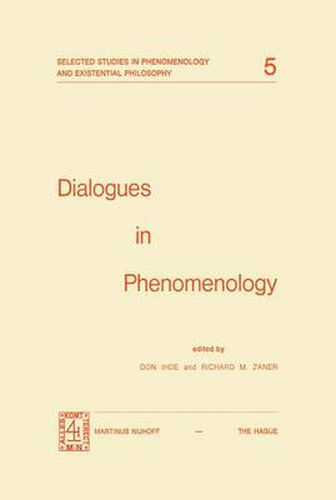Readings Newsletter
Become a Readings Member to make your shopping experience even easier.
Sign in or sign up for free!
You’re not far away from qualifying for FREE standard shipping within Australia
You’ve qualified for FREE standard shipping within Australia
The cart is loading…






This title is printed to order. This book may have been self-published. If so, we cannot guarantee the quality of the content. In the main most books will have gone through the editing process however some may not. We therefore suggest that you be aware of this before ordering this book. If in doubt check either the author or publisher’s details as we are unable to accept any returns unless they are faulty. Please contact us if you have any questions.
Phenomenology in the United States is in a state of ferment and change. Not all the changes are happy ones, however, for some of the most prominent philosophers of the first generation of phenomenologists have died: in 1959 Alfred Schutz, and within the past two years John \Vild, Dorion Cairns, and Aron Gur witsch. These thinkers, though often confronting a hostile intel lectual climate, were nevertheless persistent and profoundly influential-through their own works, and through their students. The two sources associated with their names, The Graduate Faculty of The New School for Social Research, and the circle around John Wild first at Harvard and later at Northwestern and Yale, produced a sizable portion of the now second gener ation American phenomenological philosophers. In a way, it was the very hostility of the American philo sophical milieu which became an important factor in the ferment now taking place. Although the older, first generation phenome nologists were deeply conversant with other philosophical move ments here and abroad, their efforts at meaningful dialogue were largely ignored. Determined not to remain isolated from the dominant currents of Anglo-American philosophy in par ticular, the second generation opened the way to a dialogue with analytic philosophers, especially through the efforts of the Society for Phenomenology and Existential Philosophy, led by 2 INTRODUCTION such men as James M. Edie and Hubert Dreyfus and, in other respects, Herbert Spiegelberg and Maurice Natanson.
$9.00 standard shipping within Australia
FREE standard shipping within Australia for orders over $100.00
Express & International shipping calculated at checkout
Stock availability can be subject to change without notice. We recommend calling the shop or contacting our online team to check availability of low stock items. Please see our Shopping Online page for more details.
This title is printed to order. This book may have been self-published. If so, we cannot guarantee the quality of the content. In the main most books will have gone through the editing process however some may not. We therefore suggest that you be aware of this before ordering this book. If in doubt check either the author or publisher’s details as we are unable to accept any returns unless they are faulty. Please contact us if you have any questions.
Phenomenology in the United States is in a state of ferment and change. Not all the changes are happy ones, however, for some of the most prominent philosophers of the first generation of phenomenologists have died: in 1959 Alfred Schutz, and within the past two years John \Vild, Dorion Cairns, and Aron Gur witsch. These thinkers, though often confronting a hostile intel lectual climate, were nevertheless persistent and profoundly influential-through their own works, and through their students. The two sources associated with their names, The Graduate Faculty of The New School for Social Research, and the circle around John Wild first at Harvard and later at Northwestern and Yale, produced a sizable portion of the now second gener ation American phenomenological philosophers. In a way, it was the very hostility of the American philo sophical milieu which became an important factor in the ferment now taking place. Although the older, first generation phenome nologists were deeply conversant with other philosophical move ments here and abroad, their efforts at meaningful dialogue were largely ignored. Determined not to remain isolated from the dominant currents of Anglo-American philosophy in par ticular, the second generation opened the way to a dialogue with analytic philosophers, especially through the efforts of the Society for Phenomenology and Existential Philosophy, led by 2 INTRODUCTION such men as James M. Edie and Hubert Dreyfus and, in other respects, Herbert Spiegelberg and Maurice Natanson.